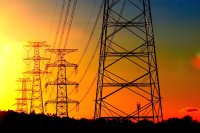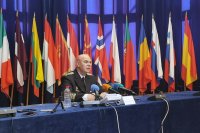The Head of State noted that in the medium and long term the euro is expected to bring benefits to the Bulgarian economy

"Perhaps I’m old-fashioned, but I strongly believe in democracy." This was stated by President Rumen Radev in response to a CNN question about whether he still supports holding a referendum on the introduction of the euro in Bulgaria in 2026. The head of state gave an interview to journalist Richard Quest from CNN following his participation in the Tashkent International Investment Forum. The President emphasised that while some leaders believe in technocracy and others belive in the driving force of the economy,
"Without democracy, the entire social structure is doomed. That is why I initiated the proposal for a referendum on our readiness to join the eurozone in 2026," Radev said.
Asked whether a constitutional crisis could arise if the Prime Minister continues to insist on euro adoption while the President insists it should happen only after a referendum, the head of state stated that there is no constitutional crisis, nor can there be one.
“There is no constitutional crisis, and there cannot be one,” he stated. “However, this could undermine the social contract between the government and Bulgarian citizens and erode public trust in the institutions,” the President stressed.

Rumen Radev reminded that in the past four years, Bulgaria has held seven parliamentary elections and that we are witnessing a decline in trust toward institutions.
"A referendum can restore trust in the Bulgarian government, because one of the goals of countries that have held referenda is precisely to strengthen the legitimacy of such processes," he added.
He also noted that the positive assessments from the European Commission and the European Central Bank are the result of years of conservative financial policy, hard work, and sacrifices - paid for by the Bulgarian citizens.
Radev noted that in the medium and long term, the euro is expected to bring benefits to the Bulgarian economy, but the lack of societal consensus is not about Bulgaria's European path—it is about whether the country is ready to adopt the euro in 2026.
When asked whether the time for a euro referendum has already passed, Rumen Radev responded that developments are extremely dynamic and things are changing rapidly—even within the EU itself. As a key example, he pointed to the UK’s exit from the EU.
The President also noted that 18 out of the 27 EU member states held referenda on joining the EU with the binding agreement to adopt the common European currency.
In response to a question about the EU’s latest round of sanctions on Russia over the war in Ukraine, President Radev called for a realistic assessment:
“First and foremost, we should understand and acknowledge and acknowledge the actual results of these sanctions—and who the real beneficiary is,” he said.
According to the President, the country most benefitting from sanctions against Russia is China, as it profits from cheap Russian energy resources and access to military technologies. With EU companies withdrawing from Russia, the large Russian market has been opened up to Chinese companies, and according to the President, this has only strengthened the bond between Russia and China.
When asked how a ceasefire and a peaceful resolution that does not reward Russia's aggression can be achieved, Rumen Radev again emphasised that the international community is "heading toward an extremely difficult political and moral dilemma."
“The Americans call this a ‘boots-on-the-ground warfare,’” the president said. “This is a battle for every inch of territory, and the most important factor in it is not the weapons, but the people.”
He warned that a critical moment is approaching when Ukraine may simply run out of soldiers willing or able to fight.
“On the other hand, do you really believe Russia will ever give up Crimea and the other occupied regions?” Radev asked. He then laid out two stark choices:
The first, he said, is to accept that in the 21st century, territory can be seized by force — effectively abandoning international law and the UN Charter.
The second is to send NATO troops to defend Ukraine and push Russia back to its 1991 borders — a move that would mean a third world war with devastating, and likely nuclear, consequences.
“This is the greatest dilemma,” he concluded.
This is why Rumen Radev stressed that he strongly supports the efforts of the new U.S. administration to initiate a peace process between Russia and Ukraine. According to the head of state, there are three tools to influence this process: military means, economic sanctions, and diplomacy—and the full potential of diplomacy has not yet been mobilized. For this reason, the Bulgarian head of state strongly supports President Trump’s efforts.
"I believe he is a pragmatic businessman who does not accept the devastation caused by any war. My disappointment is that President Trump still does not find enough support in the European Union for his peace efforts," stated Rumen Radev. The President added that some European leaders refuse to accept the reality on the battlefield—and that is also a big problem.
“This war challenges our security architecture, industrial base, economies, and social systems. But above all, it challenges our critical thinking — our ability to recognize and analyze all strategic and operational aspects, to define a desired end state, and to understand what ‘victory’ really means,” Radev said.
He added that the war in Ukraine also tests our ability to set adequate political goals and translate them into rational strategies.
Regarding his participation in the Tashkent International Investment Forum, Radev noted that cooperation with the countries of Central Asia is becoming increasingly important for the European Union. He said that Bulgaria provides the most importan element in that relationship: connectivity.
Rumen Radev stated that this opens significant prospects for developing bilateral relations with the countries in the region, for trade, and for exchange in various fields. But this requires connectivity—transport, energy, and digital—without which the opportunities for cooperation are limited. The head of state also noted that Bulgaria can participate in this process with its modernised ports in Varna and Burgas, as well as with the second busiest land border crossing in the world for freight transport, which serves as an entry point from Asia to Europe.
"We have enough problems at home to immerse ourselves in the problems of Washington, which are like an ocean compared to our Black Sea," said Rumen Radev in response to a question about his view on current events in the United States—the riots in Los Angeles, issues with the Supreme Court, and NATO.
When asked what Bulgaria expects from the United States, the head of state added that Bulgaria expects the country to be a force for stability and democracy in the world.
 Economy Minister Orders On-Site Checks at Electricity Suppliers Following Surge in Complaints
Economy Minister Orders On-Site Checks at Electricity Suppliers Following Surge in Complaints
 Sunken Fishing Vessel off Sozopol Shows No Breaches or Holes in the Hull, Navy Chief Says
Sunken Fishing Vessel off Sozopol Shows No Breaches or Holes in the Hull, Navy Chief Says
 Премиерът Андрей Гюров свиква среща с министри заради сметките за ток и цената на водата
Премиерът Андрей Гюров свиква среща с министри заради сметките за ток и цената на водата
 Ще имаме наистина страхотен хит, който ще ни представи на Евровизия, очаква Боряна Граматикова
Ще имаме наистина страхотен хит, който ще ни представи на Евровизия, очаква Боряна Граматикова